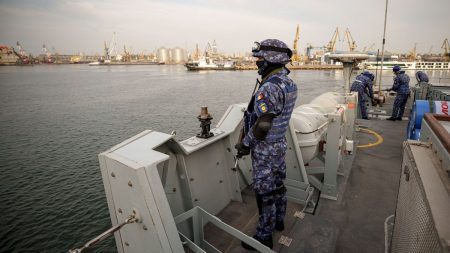The repatriation of Libyan warlord Ossama Anjiem, also known as Ossama al-Masri, from Italy to Libya has sparked controversy and raised concerns regarding Italy’s obligations to the International Criminal Court (ICC). Anjiem, wanted by the ICC for alleged war crimes and crimes against humanity, was arrested in Turin, Italy, but subsequently expelled back to Tripoli instead of being handed over to the ICC. Italy’s Interior Minister, Matteo Piantedosi, justified the expulsion citing “urgent security reasons” and the “danger posed by the subject,” but declined to elaborate further, promising a more detailed address to lawmakers in the following week. This decision has prompted criticism and accusations that Italy prioritized political expediency over its international legal obligations. The incident underscores the complex interplay between national security concerns, international legal frameworks, and the challenges of holding individuals accountable for atrocities committed in conflict zones.
The ICC issued a warrant for Anjiem’s arrest, accusing him of perpetrating heinous crimes, including murder, torture, and rape, within the Mitiga prison in Libya, starting in 2015. These alleged crimes carry a potential sentence of life imprisonment. The ICC warrant was transmitted to member states, including Italy, with explicit instructions to contact the court without delay if any issues arose regarding cooperation. Despite this, Italy’s court of appeals ordered Anjiem’s release, citing a procedural error in his arrest, specifically the failure to inform the Justice Minister, who is responsible for handling relations with the ICC, prior to the arrest. The subsequent repatriation of Anjiem on an Italian government plane raised questions about Italy’s commitment to upholding international law and cooperating with the ICC in pursuing justice for victims of war crimes.
Human rights organizations have expressed grave concerns regarding the conditions in Libyan detention facilities, where migrants are often held. These organizations have documented widespread human rights abuses within these facilities, raising alarms about the safety and well-being of detainees. Anjiem’s return to Libya, where he reportedly received a hero’s welcome, further intensifies these concerns. Critics argue that Italy’s decision to expel Anjiem effectively condones his alleged crimes and exposes vulnerable individuals within Libyan detention centers to potential harm. They accuse Italy of complicity in the mistreatment of migrants and of undermining efforts to hold perpetrators of human rights abuses accountable.
The case of Ossama Anjiem highlights the intricate challenges associated with balancing national interests with international legal obligations. Italy’s decision to prioritize its perceived security concerns over its commitment to the ICC raises questions about the effectiveness of international justice mechanisms and the willingness of states to cooperate fully in pursuing accountability for war crimes. The controversy surrounding Anjiem’s repatriation also underscores the need for greater transparency and accountability in the handling of such cases, particularly when they involve individuals accused of grave human rights violations. The lack of clear explanation from the Italian government regarding the “urgent security reasons” that prompted Anjiem’s expulsion further fuels speculation and criticism.
Furthermore, the incident underscores the precarious situation of migrants and refugees in Libya. Human rights organizations have consistently documented the dire conditions and abuses faced by migrants in Libyan detention centers, highlighting the urgent need for international action to protect these vulnerable populations. Anjiem’s return to Libya, where he holds a position of authority, raises serious concerns about the potential for further human rights violations and the safety of those held in detention. The international community must hold Libya accountable for ensuring the humane treatment of all individuals within its borders, including migrants and refugees, and work to address the root causes of the migration crisis that has placed so many individuals at risk.
The repatriation of Ossama Anjiem has sparked a debate about the efficacy and limitations of international justice mechanisms. While the ICC plays a crucial role in holding individuals accountable for war crimes and crimes against humanity, its effectiveness depends on the cooperation of member states. Italy’s decision to expel Anjiem, despite the ICC warrant, undermines the authority of the court and sets a potentially dangerous precedent for future cases. This incident underscores the importance of strengthening international cooperation and ensuring that states fulfill their obligations under international law to bring perpetrators of atrocities to justice and protect the rights of victims. The international community must work together to uphold the principles of justice and accountability and prevent impunity for those who commit grave human rights violations.










